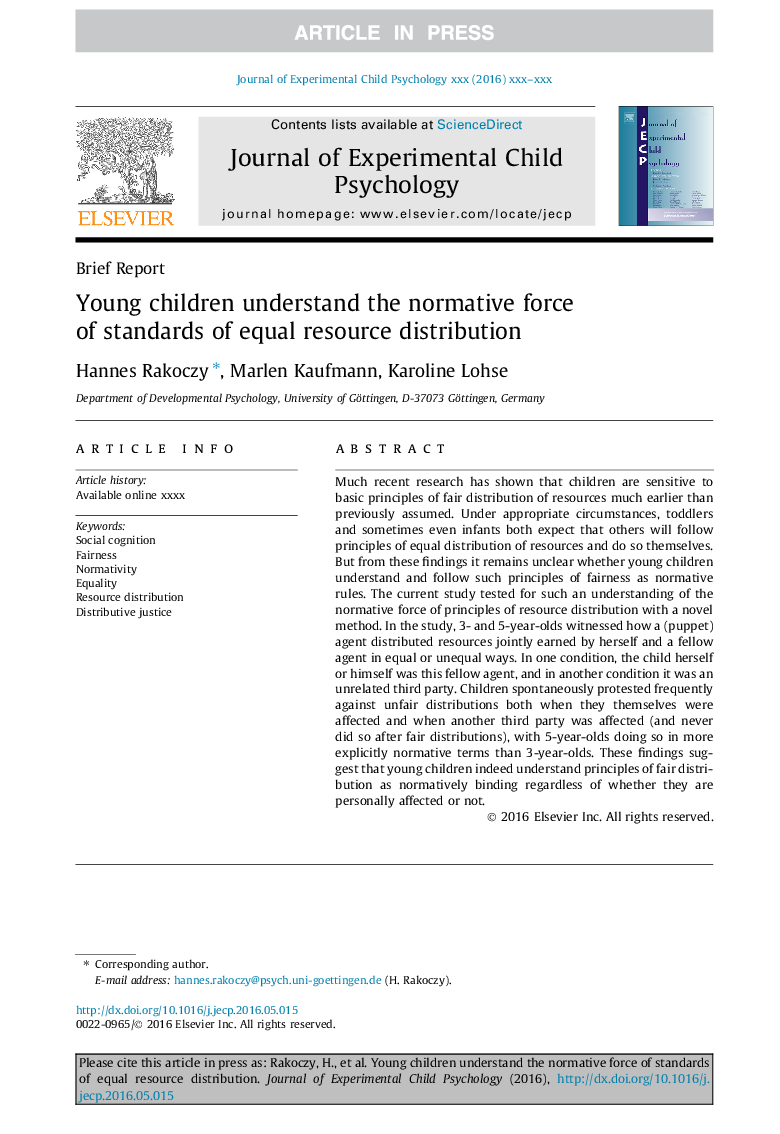| کد مقاله | کد نشریه | سال انتشار | مقاله انگلیسی | نسخه تمام متن |
|---|---|---|---|---|
| 7274568 | 1473462 | 2016 | 8 صفحه PDF | دانلود رایگان |
عنوان انگلیسی مقاله ISI
Young children understand the normative force of standards of equal resource distribution
ترجمه فارسی عنوان
کودکان نیروی هنجاری استانداردهای توزیع مساوی منابع را درک می کن
دانلود مقاله + سفارش ترجمه
دانلود مقاله ISI انگلیسی
رایگان برای ایرانیان
کلمات کلیدی
شناخت اجتماعی، عادلانه، نورمتی، برابری، توزیع منبع، عدالت توزیع،
ترجمه چکیده
پژوهش های اخیر نشان داده است که کودکان به اصول اساسی توزیع منصفانه منابع بسیار حساس هستند نسبت به پیش فرض های قبلی. تحت شرایط مناسب، کودکان نوپا و گاه حتی نوزادان هم انتظار دارند که دیگران از اصول توزیع مجدد منابع پیروی کنند و این خودشان را انجام دهند. اما از این یافته ها هنوز معلوم نیست که آیا بچه های جوان این اصول عدالت را به عنوان قوانین هنجاری می فهمند و پیروی می کنند. پژوهش حاضر برای درک نیروی هنجاری اصول توزیع منابع با یک روش جدید آزمایش شده است. در این مطالعه، 3 و 5 ساله شاهد چگونگی توزیع منابع (عروسک خیمه) منابع به طور مشترک به وسیله خود و یک نماینده همگانی به صورت یکسان یا نابرابر بود. در یک شرایط، فرزند خودش یا خودش این عامل همکار بود و در شرایط دیگری یک شخص ثالث غیر مرتبط بود. کودکان به طور خودبخشی به توزیعهای غیرمنصفانه هر دو در زمانی که خودشان تحت تأثیر قرار گرفتند و زمانی که شخص ثالث دیگری تحت تأثیر قرار گرفتند (و بعد از آن پس از توزیع منصفانه) به طور مرتب اعتراض کردند، و 5 ساله این کار را در شرایط صریحتر هنجاری نسبت به 3 سالگی انجام دادند. این یافته ها حاکی از آن است که بچه های جوان در حقیقت اصول توزیع منصفانه را به عنوان الزام قانونی بدون در نظر گرفتن اینکه آیا آنها شخصا تحت تاثیر قرار گرفته یا نه، درک می کنند.
موضوعات مرتبط
علوم انسانی و اجتماعی
روانشناسی
روانشناسی رشد و آموزشی
چکیده انگلیسی
Much recent research has shown that children are sensitive to basic principles of fair distribution of resources much earlier than previously assumed. Under appropriate circumstances, toddlers and sometimes even infants both expect that others will follow principles of equal distribution of resources and do so themselves. But from these findings it remains unclear whether young children understand and follow such principles of fairness as normative rules. The current study tested for such an understanding of the normative force of principles of resource distribution with a novel method. In the study, 3- and 5-year-olds witnessed how a (puppet) agent distributed resources jointly earned by herself and a fellow agent in equal or unequal ways. In one condition, the child herself or himself was this fellow agent, and in another condition it was an unrelated third party. Children spontaneously protested frequently against unfair distributions both when they themselves were affected and when another third party was affected (and never did so after fair distributions), with 5-year-olds doing so in more explicitly normative terms than 3-year-olds. These findings suggest that young children indeed understand principles of fair distribution as normatively binding regardless of whether they are personally affected or not.
ناشر
Database: Elsevier - ScienceDirect (ساینس دایرکت)
Journal: Journal of Experimental Child Psychology - Volume 150, October 2016, Pages 396-403
Journal: Journal of Experimental Child Psychology - Volume 150, October 2016, Pages 396-403
نویسندگان
Hannes Rakoczy, Marlen Kaufmann, Karoline Lohse,
